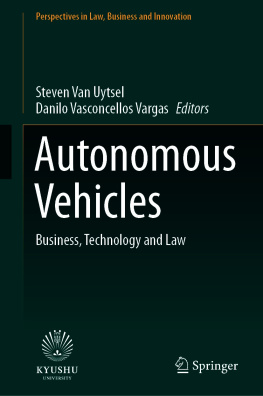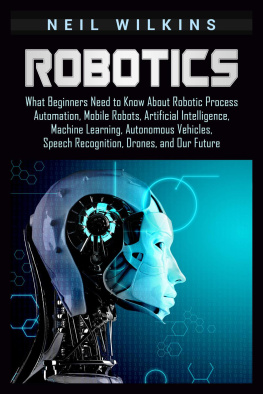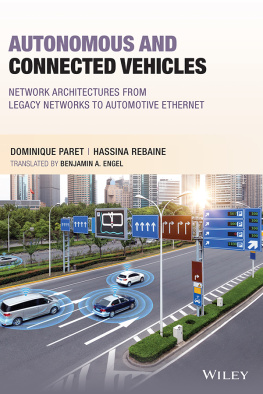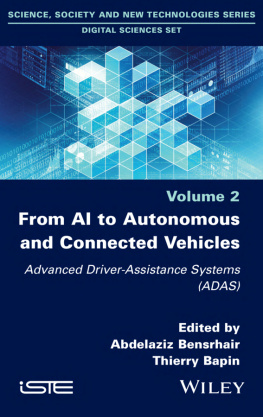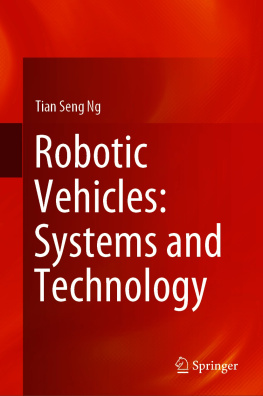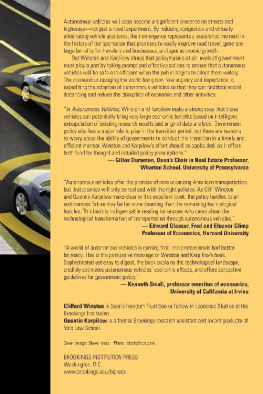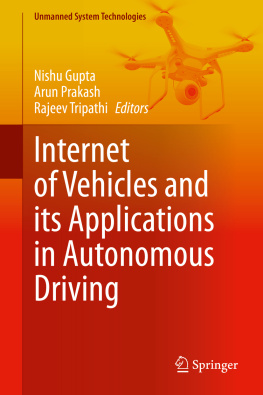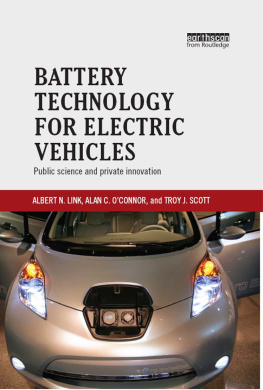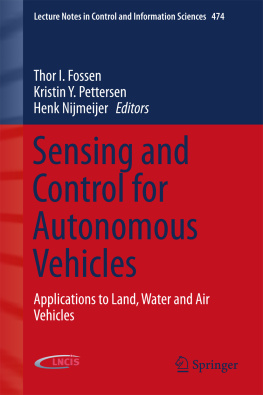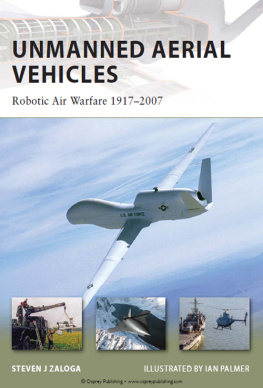Steven Van Uytsel - Autonomous Vehicles: Business, Technology and Law
Here you can read online Steven Van Uytsel - Autonomous Vehicles: Business, Technology and Law full text of the book (entire story) in english for free. Download pdf and epub, get meaning, cover and reviews about this ebook. year: 2021, publisher: Springer Singapore, genre: Romance novel. Description of the work, (preface) as well as reviews are available. Best literature library LitArk.com created for fans of good reading and offers a wide selection of genres:
Romance novel
Science fiction
Adventure
Detective
Science
History
Home and family
Prose
Art
Politics
Computer
Non-fiction
Religion
Business
Children
Humor
Choose a favorite category and find really read worthwhile books. Enjoy immersion in the world of imagination, feel the emotions of the characters or learn something new for yourself, make an fascinating discovery.
- Book:Autonomous Vehicles: Business, Technology and Law
- Author:
- Publisher:Springer Singapore
- Genre:
- Year:2021
- Rating:5 / 5
- Favourites:Add to favourites
- Your mark:
- 100
- 1
- 2
- 3
- 4
- 5
Autonomous Vehicles: Business, Technology and Law: summary, description and annotation
We offer to read an annotation, description, summary or preface (depends on what the author of the book "Autonomous Vehicles: Business, Technology and Law" wrote himself). If you haven't found the necessary information about the book — write in the comments, we will try to find it.
Autonomous Vehicles: Business, Technology and Law — read online for free the complete book (whole text) full work
Below is the text of the book, divided by pages. System saving the place of the last page read, allows you to conveniently read the book "Autonomous Vehicles: Business, Technology and Law" online for free, without having to search again every time where you left off. Put a bookmark, and you can go to the page where you finished reading at any time.
Font size:
Interval:
Bookmark:
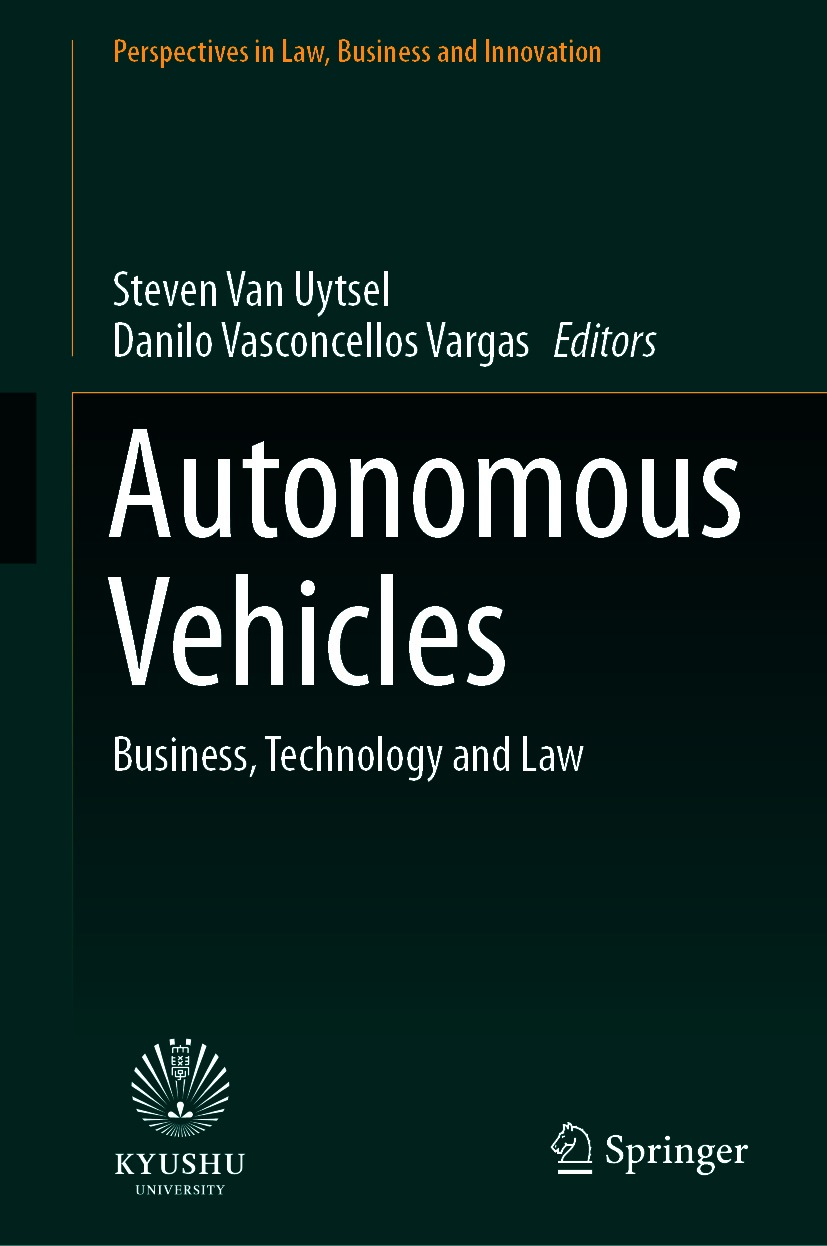
Over the last three decades, interconnected processes of globalization and rapid technological change particularly, the emergence of networked technologies have profoundly disrupted traditional models of business organization. This economic transformation has created multiple new opportunities for the emergence of alternate business forms, and disruptive innovation has become one of the major driving forces in the contemporary economy. Moreover, in the context of globalization, the innovation space increasingly takes on a global character. The main stakeholders innovators, entrepreneurs and investors now have an unprecedented degree of mobility in pursuing economic opportunities wherever they arise. As such, frictionless movement of goods, workers, services, and capital is becoming the new normal.
This new economic and social reality has created multiple regulatory challenges for policymakers as they struggle to come to terms with the rapid pace of these social and economic changes. Moreover, these challenges impact across multiple fields of both public and private law. Nevertheless, existing approaches within legal science often struggle to deal with innovation and its effects.
Paralleling this shift in the economy, we can, therefore, see a similar process of disruption occurring within contemporary academia, as traditional approaches and disciplinary boundaries both within and between disciplines are being re-configured. Conventional notions of legal science are becoming increasingly obsolete or, at least, there is a need to develop alternative perspectives on the various regulatory challenges that are currently being created by the new innovation-driven global economy.
The aim of this series is to provide a forum for the publication of cutting-edge research in the fields of innovation and the law from a Japanese and Asian perspective. The series will cut across the traditional sub-disciplines of legal studies but will be tied together by a focus on contemporary developments in an innovation-driven economy and will deepen our understanding of the various regulatory responses to these economic and social changes.
The series editor and editorial board carefully assess each book proposal and sample chapters in terms of their relevance to law, business, and innovative technological change. Each proposal is evaluated on the basis of its academic value and distinctive contribution to the fast-moving debate in these fields.
All books and chapters in the Perspectives in Law, Business and Innovation book series are indexed in Scopus.
Series Editor:
Toshiyuki Kono (Professor, Faculty of Law, Kyushu University, Fukuoka, Japan)
Editorial Board:
Erik P. M. Vermeulen (Professor of Business & Financial Law, Tilburg University & Philips Lighting, The Netherlands)
Claire Hill (James L. Krusemark Chair in Law, University of Minnesota Law School, USA)
Wulf Kaal (Associate Professor & Director of the Private Investment Institute, University St. Thomas, USA)
Ylber A. Dauti (Founding Partner The Dauti Law Firm, PC, USA)
Pedro de Miguel Asensio (Professor, Complutense University of Madrid, Spain)
Nikolaus Forgo (Professor, University of Vienna, Austria)
Shinto Teramoto (Professor, Kyushu University, Japan)
Urs Gasser (Executive Director, Berkman Klein Center for Internet & Society at Harvard University; Professor of Practice, Harvard Law School, USA)
More information about this series at http://www.springer.com/series/15440

This Springer imprint is published by the registered company Springer Nature Singapore Pte Ltd.
The registered company address is: 152 Beach Road, #21-01/04 Gateway East, Singapore 189721, Singapore
This edited collection aims to bring together scholars working on various aspects of autonomous vehicles. Our aim in developing this collection was to bring together a multidisciplinary team to exchange ideas on the challenges for the deployment of autonomous vehicles and on how autonomous vehicles will test accepted views within different disciplines.
This volume is based on ideas explored at a symposium, Multidisciplinary Perspectives on Autonomous Driving, held in Kyushu University, Fukuoka, Japan on February 1, 2019.
Steven Van Uytsel would like to thank Kyushu University for providing the following grants: (1) Progress 100: Research Hub for the Humanities, Social Sciences, and Interdisciplinary Knowledge (RINK) and (2) QR Program: TsubasaProject [Interdisciplinary Research by Young Researchers]. These grants were given for the following projects: Regulating Algorithms: (1) Multi-Disciplinary Perspectives on New Technology & the Law and (2) Misleading Algorithms: Interdisciplinary Perspectives on the Implications for Law. Both projects were instrumental for the development of the ideas presented in this book.
The editors also owe a word of gratitude to Mrs. Y. Matsumura, whose help was instrumental for organizing the symposium and editing the footnotes. The editors are also grateful to Mrs. Intachan Chirachawee, who also assisted in the editing of the footnotes.
Font size:
Interval:
Bookmark:
Similar books «Autonomous Vehicles: Business, Technology and Law»
Look at similar books to Autonomous Vehicles: Business, Technology and Law. We have selected literature similar in name and meaning in the hope of providing readers with more options to find new, interesting, not yet read works.
Discussion, reviews of the book Autonomous Vehicles: Business, Technology and Law and just readers' own opinions. Leave your comments, write what you think about the work, its meaning or the main characters. Specify what exactly you liked and what you didn't like, and why you think so.

